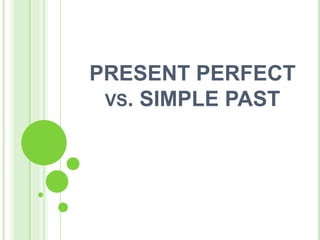present-perfect-vs-simple-past.pptx
•Als PPTX, PDF herunterladen•
0 gefällt mir•5 views
present perfect vs past simple
Melden
Teilen
Melden
Teilen

Empfohlen
Empfohlen
Weitere ähnliche Inhalte
Ähnlich wie present-perfect-vs-simple-past.pptx
Ähnlich wie present-perfect-vs-simple-past.pptx (20)
PresentandPastPerfect.JoselynSantana.English1.pptx

PresentandPastPerfect.JoselynSantana.English1.pptx
Sandra suleydi chavez perdomo.. practica #1. 5 to p.a.

Sandra suleydi chavez perdomo.. practica #1. 5 to p.a.
Kürzlich hochgeladen
Mehran University Newsletter is a Quarterly Publication from Public Relations OfficeMehran University Newsletter Vol-X, Issue-I, 2024

Mehran University Newsletter Vol-X, Issue-I, 2024Mehran University of Engineering & Technology, Jamshoro
God is a creative God Gen 1:1. All that He created was “good”, could also be translated “beautiful”. God created man in His own image Gen 1:27. Maths helps us discover the beauty that God has created in His world and, in turn, create beautiful designs to serve and enrich the lives of others.
Explore beautiful and ugly buildings. Mathematics helps us create beautiful d...

Explore beautiful and ugly buildings. Mathematics helps us create beautiful d...christianmathematics
Kürzlich hochgeladen (20)
Z Score,T Score, Percential Rank and Box Plot Graph

Z Score,T Score, Percential Rank and Box Plot Graph
Explore beautiful and ugly buildings. Mathematics helps us create beautiful d...

Explore beautiful and ugly buildings. Mathematics helps us create beautiful d...
On National Teacher Day, meet the 2024-25 Kenan Fellows

On National Teacher Day, meet the 2024-25 Kenan Fellows
Micro-Scholarship, What it is, How can it help me.pdf

Micro-Scholarship, What it is, How can it help me.pdf
Beyond the EU: DORA and NIS 2 Directive's Global Impact

Beyond the EU: DORA and NIS 2 Directive's Global Impact
Measures of Central Tendency: Mean, Median and Mode

Measures of Central Tendency: Mean, Median and Mode
Ecological Succession. ( ECOSYSTEM, B. Pharmacy, 1st Year, Sem-II, Environmen...

Ecological Succession. ( ECOSYSTEM, B. Pharmacy, 1st Year, Sem-II, Environmen...
Energy Resources. ( B. Pharmacy, 1st Year, Sem-II) Natural Resources

Energy Resources. ( B. Pharmacy, 1st Year, Sem-II) Natural Resources
Asian American Pacific Islander Month DDSD 2024.pptx

Asian American Pacific Islander Month DDSD 2024.pptx
This PowerPoint helps students to consider the concept of infinity.

This PowerPoint helps students to consider the concept of infinity.
Unit-V; Pricing (Pharma Marketing Management).pptx

Unit-V; Pricing (Pharma Marketing Management).pptx
present-perfect-vs-simple-past.pptx
- 1. PRESENT PERFECT VS. SIMPLE PAST
- 2. WHAT IS THE DIFFERENCE? I’ve been to London. (present perfect) I went to London last week. (simple past)
- 3. TIME FINISHED UNFINISHED SIMPLE PAST PRESENT PERFECT I went to London I’ve been to London. last week. Specific time: - yesterday General experience. - last summer - 2 months ago
- 4. WHEN DO WE USE SIMPLE PAST? 1) Actions that are not connected with present. The Titanic sank in 1912. 2) Actions in the past that are chronologically ordered. He came in, sat on the sofa and started waiting. 3) Repeated actions in the past (= used to). I took English courses when I was twelve (= I used to take English courses). 4) When after talking about general experience we give details (when we have to be SPECIFIC and answer questions like WHEN? WHERE? WHY? HOW?). I’ve been to London this month. I stayed in a big hotel. I visited Trafalgar Square and bought some souvenirs.
- 5. WHEN DO WE USE PRESENT PERFECT? 1) When we talk about GENERAL EXPERIENCE without giving specific information (we don’t have to know WHEN you did something, we want to know IF you did it or not). Tarantino has directed lots of blockbusters. (BUT: Tarantino directed “Kill Bill” in 2003). I have never seen the Eiffel Tower. (BUT: I didn’t see the Eiffel Tower when I was in France). Jack has written a script. (BUT: He wrote the script last week).
- 6. WHEN DO WE USE PRESENT PERFECT? 2) Actions that are finished in the past but connected with present (actions in the past affected the present – you can see the result). X Past Present I’ve eaten a banana. A plane has landed.
- 7. WHEN DO WE USE PRESENT PERFECT? 3) When we want to express an unfinished period of time (that started in the past but continues now). I have taken three tests this semester (this semester is not finished, it’s still going on). Helen has been to London once in her life (her life is not finished, it’s still going on). My grandparents have seen “Hamlet” this week (this week is not finished, it’s still going on).
- 8. HOW DO WE MAKE PRESENT PERFECT FORM? Affirmative sentences: Subject Auxiliary Verb Past Participle I You We They have seen He She It has seen
- 9. HOW DO WE MAKE PRESENT PERFECT FORM? Negative sentences: Subject Auxiliary Verb Past Participle I You We They haven’t (=have not) seen He She It hasn’t (=has not) seen
- 10. HOW DO WE MAKE PRESENT PERFECT FORM? Interrogative sentences: Yes, I have. No, we haven’t. Yes, he has. No, she hasn’t. Auxiliary Verb Subject Past Participle Have I you we they seen? Has he she it seen?
- 11. PAST PARTICIPLE FORM OF VERBS see seen go gone cut cut eat eaten work worked catch caught leave left arrive arrived feed fed make made bring brought give given drink drunk do done buy bought teach taught
- 12. LET’S PRACTICE A LITTLE! 1. I ……… (see) that film before. 2. We ………. (read) three English books in class. 3. My mother ……….. (be) to London twice this year. 4. John ………… (borrow) four CDs from me. 5. The children ………… (eat) breakfast. 6. You ………… (drink) all the coffee. 7. Be quiet! The film ………….. (start).
- 13. LET’S PRACTICE A LITTLE! 1. I have seen that film before. 2. We have read three English books in class. 3. My mother has been to London twice this year. 4. John has borrowed four CDs from me. 5. The children have eaten breakfast. 6. You have drunk all the coffee. 7. Be quiet! The film has started.